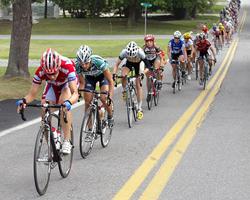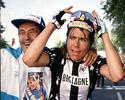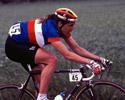
Recently on Cyclingnews.com |
US Women's Cycling Development Program diary

|
The US Women's Cycling Development program was founded by former pro rider, Michael Engleman, as a way to help promising young women cyclists reach their full potential as athletes. The USWCDP networks current and former women pro riders with up and coming athletes through mentoring and coaching.
With experienced mentors like Olympians Dede Barry and Mari Holden, along with current pros Amber Neben, Tina Pic, Kim Anderson and others, the USWCDP helps young riders like Mara Abbott, Katharine Carroll and many more to race better, find teams and become professional bike racers. The dedicated and well spoken women of this program provide thoughtful, compelling and sometimes hilarious anecdotes of their experiences in this diary.
For further reading about the programme, visit the USWCDP website
May 30, 2008
The USWCDP was created not as a replacement for anything or to be a copy of any Federation or other cycling program. The USWCDP is here as a network for all those that really want to help the sport of women's cycling and you will be seeing a series of diaries from current and former pro women athletes who are going to say exactly what they think.
One such person is Marion Clignet, a Franco-American former professional who is now retired. Despite suffering from epilepsy Clignet has won six world titles, two Olympic Games silver medals and over 180 races world wide. - Michael Engleman
Equality for women in sport
So, what do 'retired' women cyclists do? Well...I'll tell you what I'm doing over here in my little corner of the world.
I still log onto various websites to see who's winning the top women's races, who's coming up, what - if any - country has changed it's politics in favor of promoting women's cycling.
Why do I log onto websites? Because the Women's World Cups have yet to make it on television, in particular in Europe where the Women's World Cups are numerous and very competitive. French television, for example, shows only the men's ProTour events with no excuse to claim it's because they anticipate a French victory.
So why not show the women? What better market then competitive young women showing the world what strengths women have!
On a recent trip to the UCI World Track Championships in Manchester, United Kingdom I can only remember the shock and tears I felt as I observed the velodrome from 'up above'. A fair share of the team boxes had women serving coffee or giving rubs but not a whole lot seemed to be warming up for events.
If I read correctly in a recent article at the Olympic Games in Beijing, China there will be 153 men competing for 35 women in the track event. The women sprinters have been reduced to only one event, since the 500 metres was taken out and the kirein is only Olympic for men...who also have the team sprint chalking up three events for the male sprinters.
What really saddened me was to see a particular box filled with men in suits and ties talking up their latest bikes, components, and wheels...obliviously ignorant that athletes were warming up in that box. What sickened me was certain countries relying on former Tour de France roadies to comment the UCI World Track Championships because they were mates of the producers and, while very good guys, know absolutely nothing about track (and even less about women).
In an event where Marianne Vos put on a one-woman show in the points race and Rebecca Romero showed how fast she's come up and what a true Olympian she is in the 3000 pursuit, these guys couldn't give you the little extra information that people would want to know. Vos - at 20 and a student - is already triple World Champion and World Cup winner, Romero tried the track for the first time in 2006 falling her first time around and then going on to a silver medal at the World Championship's in Mallorca before winning in Manchester this year.
Women, for the most part, race out of passion. Professional teams have started to sprout up over the last 10 years with the real definition of 'professional' up for debate. To some, professional means you ride for a structured team that provides equipment, travel costs to races covered...and how do you live? At times in a team group house, comfy or not, it becomes more than full time.
Some teams, though my guess is no more than six at the moment, actually pay their riders a salary along with a full program tailored to each rider's strength and needs. How is it that the country that organizes the biggest bike race in the world is the only - or one of the few - one's in Europe with no professional women's teams?
I read about recent races in the United States of America and I saw that one person is still ragging because she lost time at the start of a race. She claims she should have won, despite a handlebar discrepancy or whatever, yeah, some things don't change. It may not have changed a thing, the road race may have been harder and the whole outcome could've been different and at over 40 we could all race again and be competitive given a level playing field.
On reading a young rider's diary on her first season in Italy I had to laugh as I had also lived this experience a few years back. Living in a group house, not always sure of when and where we were racing, thinking a stage was flat and with 40 kilometres to go out of nowhere sprouted a small mountain. I have to say though that the Italians are passionate, they show all of the women's races on television and we were extremely well equipped.
So, as I ramble on, I'll mention some of the positive I came across in Manchester. In talking to teams such as Great Britain and Australia I was relieved to see that they do recruit from other sports to find strong women and welcome them to their sport.
Romero, from the United Kingdom, is a former Olympian and World Champion rower. The Dutch have a legendary women's program and always have someone on the back burner. The United States of America has great depth and isn't it ironic that the women who medaled there did it on their own.
There is so much talent out there, it can't be impossible to find or mediatise. The first bike race I ever saw was the Los Angeles Olympic Games on television and I still remember Connie Carpenter crossing the finish line on her bike for gold. Having come from skating where she attended her first Olympics at only 14!
I met Connie in Manchester and we discussed the necessity of recruiting women from other sports and giving them that extra boost. The American women, as do the German and Dutch, have a good crack at winning gold in Beijing.
So what's missing? Equality across the board, full world wide media
coverage, not to mention more professional structures.
Hmmm, I was just supposed to write a few lines, I promise to keep it shorter
next time but I'm still very passionate about cycling and see so much talent
that doesn't get her fair chance to show herself.
Ciao, ciao!
Marion Clignet
www.marionclignet.org
Photography
For a thumbnail gallery of these images, click here
Images by Marion Clignet
- I was in the winning break where I took a second French road title.
- My second French National Championship and one happy club president.
- On my way to winning the pre-Olympic road race in Barcelona, Spain.
- I'd just won the Tour de l'Aude's time trial which got me the yellow jersey.




